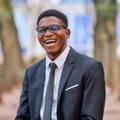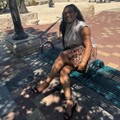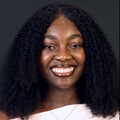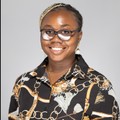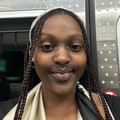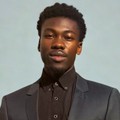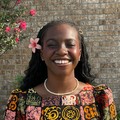“BUT I WAS ONLY 7, GRANDMA ”
Just 27 km outside Lagos, in the suburbs, was my community. Not my hometown, but where I spent most of my childhood in Nigeria. Like many small communities, ours thrived on close-knit relationships, with elders guiding the way. For my family, Grandma was our rock across three generations.
By the time I was seven, I had become aware of the political unrest in my country. Government corruption left infrastructure crumbling, power unreliable, and healthcare overburdened. In communities like mine, resourcefulness wasn’t just a skill — it was a survival. When something broke, we fixed it. When a need arose, we met it. We cultivated farmlands, raised poultry, hand-sewed outgrown trousers into shorts, dug boreholes, and treated anything from colds to malaria with traditional remedies passed down for generations. I learned to appreciate collective knowledge and problem-solving in navigating daily challenges.
Schools reinforced this mindset through practical arts and crafts — tie-dye and batik techniques, pottery, woodwork, and tailoring amongst others — ensuring that even those who couldn’t afford higher education had a means of survival. My grandmother, a teacher in her youth, made this transition seamless, extending those lessons beyond the classroom. Hence, education became more than simply a means of survival; it was a path to unlocking something greater.
I approached what could have been my final years of education eager to end on a high note, redefining my academic excellence while expanding my impact on my community. I became the only student in my cohort to achieve a perfect score in the board exams — West African Senior School Certificate Examination (WASSCE). Concurrently, I co-founded the Friends of Nature Club, rallying over 60 students to promote environmental awareness and launching initiatives like recycling stations. During my gap year, I volunteered with Eden, an eco-NGO, where I built their website, curated content, and expanded their outreach. These experiences reinforced my belief that the intersection of science, community, and innovation holds the key to real change.
Yet, I acknowledged that to make more lasting impacts, I needed access to higher education — an opportunity presently disrupted by academic strikes and political instability in Nigeria. Even the few private universities, though more stable, were financially out-of-reach for my family, especially with rising inflation and currency devaluation. Much like tenderlings I transplanted with Grandma from crowded nurseries to guano-fertilized fields, I sought an environment where I could grow and thrive. That search led me to the United States.
Now, as a Chemical and Biomolecular Engineering student on the Pre-Med Track, I see reflections of my upbringing in my academic pursuits. The same hands-on approach I once used in DIY repairs as a child now translates into my research projects and interests in medical engineering, surgery, and biotechnology. I envision a future where I develop life-saving solutions — perhaps through regenerative medicine, biodegradable implants, or surgical innovations. In the long run, I hope to channel this passion into founding my biotech company, aiming to mitigate neurodegeneration and age-related conditions among the older population in underserved communities, like mine. Beyond continuing their good work, I aspire to also pay forward the kindness of elders who nurture resilience and guide generations by providing opportunities for healthier lives post-retirement.
Looking back, every experience — from moulding clay toys to designing engineering prototypes — has been a step toward that vision. The ingenuity and resilience instilled in me remain the foundation of my ambitions, and I appreciate your support on this journey.
SATURDAY MORNINGS: WITH FOURS
20. Draw the blinds and set the timer; it's another Saturday morning. For my family, the last day of each week meant reviewing, tidying, and planning—consistently as a heartbeat. But, as soon as my mum's door opened that day, I amplified the ABBA Gold album with our SONY HT-S20R subwoofer. Jumping out from behind the parlor chairs with my siblings and dad to shout "Happy Birthday," my mum was genuinely taken aback. Mum had instilled in us the value of consistency, so few things surprised her. Even then, as we swayed to the pop-disco that animated every Saturday morning of our childhood, I counted the dessert trays on the walnut-brown center table—four.
16. 4±1-year-old, on a rainy Saturday morning, I laid out the sixteen chess pieces for each player, opening the game with my older sister. Losing all eight pawns halfway to the other side, I threw a tantrum, striking her with our wooden chess board. Moving to the suburbs four years later, I realized the chess board and 'tetchy-me' were misplaced in transit. My mum, acknowledging my temper and sweet tooth, had taken a four-month baking class and taught me to channel my energy into kneading dough and practical activities. From crafting recipes to martial arts, I understood my emotional patterns, reaching the other side: once a tetchy pawn, now a noble knight. Though neither clad in shiny armor nor legendary as Sir Galahad, I enlivened student council meetings and community get-togethers with homemade treats.
12. Four hours past noon [4:00 pm], my siblings and I began our 12-minute walk to the community church. Tending the barren fields in our new suburban residence had replaced board games on Saturday mornings; for the evenings, I learned catechism or trained altar servers. Interacting with ecosystems, natural or human, I became enthralled by the intricate balance and interdependence that governed both, eager to understand the underlying (neural) processes and be part of such stories. Armed with my mum's green fingers, I moved on from fertilizing our fields with guano and preparing herbal remedies to starting an ornamental garden at our community church and an eco-club in high school.
8. Multiplying by ten [80] equals the number of senior students enrolled in my high school pioneer peer-tutoring sessions, and by a hundred [800], estimates the number of students I represented as the Head Boy on the Student Council. As these journeys progressed to a close, I matched my interests with the next step: college and career. Doing this consistently, as with my Saturday morning chores, I realized that whatever I had embarked on, my mum had inspired me to see it through to completion. However, the end appeared elusive for higher education in my home country—Nigeria. Frequent academic strikes and political tensions had rendered the system inconsistent, spanning more than four years. Even then, pursuing a neuro-engineering career was not feasible—bioengineering was barely a nascent field.
4. Snapping back to the present as I review my course schedule on this fine Saturday morning, I dare to complete Ian Fleming's quote: "Once is a chance, twice is a coincidence, thrice is a pattern" with "quarce is a factor." Regarding higher education, four is one of the pinnacles of academic excellence [GPA] I aim for, besides being the typical span of years. Armed with the advanced resources and stable environment of a U.S. education, I aspire to combat neurodegeneration—increasing life expectancy—by my fourth year at college. Upon graduation, I would continue at medical school and launch my biotech company, ODIAX—"Odia" is my family name, and "X" marks the problems we'd solve.
Growing up in Ghana in a lower-class family, where access to basic necessities like food was a daily struggle, taught me the value of resilience and determination. Despite the limited opportunities, I learned to capitalize on every chance that came my way. My educational journey has been marked by numerous challenges, but I have consistently demonstrated my ability to adapt and thrive.
During my high school days, I witnessed my father's debilitating battle with a disease that left him paralyzed for years. This misfortune forced my mother to shoulder the responsibilities of the breadwinner, placing a heavy burden on our family. In response, I became creative and resourceful, opening a small food shop to help alleviate food insecurity exacerbated by the COVID-19 pandemic. This venture not only improved my family's financial situation but also provided me with the resources needed to continue my education.
In school, I co-founded the We Aid You Smile Foundation, which supported street children and women from low-income households. I also led the Gifted Hands initiative, teaching young girls valuable skills like crocheting, making necklaces and earrings, and crafting bags with beads to generate income in order to limit their over dependence on men. Furthermore, I helped establish Food On Wheels, providing nutritious meals for street children. These experiences solidified my passion for social work, a field dedicated to enhancing people's welfare and providing essential resources for their development.
As someone who has experienced hardship, I am driven to be a source of hope for others. Social work resonates with me because it seeks to improve the economic, social, and biological state of individuals. I am eager to provide support and resources to those in need, empowering them to overcome challenges. Pursuing this dream in the United States has presented new challenges, including securing a stable income to cover educational expenses and living costs. I often rely on borrowed materials such as textbooks and computer, or my mobile phone to complete tasks, which hinders my academic progress.
Despite these obstacles, I remain committed to becoming a social worker, and I believe that this scholarship will be instrumental in helping me achieve my goal. Academic achievements alone are insufficient to complete this journey. To truly make a meaningful impact, I need to overcome various challenges that lie ahead. Receiving this scholarship would be a vital step in addressing these obstacles, empowering me to become a dedicated social worker who can be a pivotal part of someone's success story. Ultimately, this support would enable me to contribute to creating a brighter, more compassionate world, where I can make a lasting difference in the lives of others.
"CHECK THE DICTIONARY"
Staring at me unapologetically while I doodled with my little orange pencil in my notebook, my father reiterated, "Check the dictionary."
The clock chimed two hours to midnight, yet all attempts for him to define the dozen-and-one words in my fourth-grade vocabulary assignment proved futile. Dad believed they were mere combinations of alphabets, so I needed to roll up my sleeves. Now and then, when Dad insisted that my siblings and I peruse the dictionary for such answers, we always found them in there. I became accustomed and then looked forward to playing Scrabble on Saturday mornings and receiving encyclopedias and puzzles, not video games, as presents. Indifferently, then eagerly perusing these, I gradually understood that no solution was elusive. There is always an answer. But how do I find it?
Growing up with my paternal family of philosophers, I learned to seek the rationale behind concepts. Playing ball games demanded spatial awareness and proprioception; drawing, my favorite pastime, insisted on continuing a dot across a blank paper. To even exist within my comfort zone, I desired to understand the underlying principles, as everything seemed to have one — its algorithm. If every seemingly new idea were a slight modification or yet-predictable application of a basic concept, wouldn't every challenge be surmountable once I grasped the algorithm? Was I running on an algorithm?
Bird-watching or Rubix-cubing, I considered such possibilities, taking my brain on a wild joyride while appreciating [cyclical] problem-solving patterns. Developing an interest in neural processes, I stumbled upon a WIRED article on Irish neurosurgeon Phil Kennedy, who — in an attempt to induce synthetic communication in ALS patients — hacked his brain and almost lost his mind. Enthralled by the possibility of fusing a career in medicine with engineering, I recall dragging my thirteen-year-old self out of bed the following day, having stayed up late, eager to debate the ethical concerns with my eighth-grade class. Leading such conversations in my high school community catalyzed my interest in neuro-engineering. Still, as this field is yet nascent in my home country — Nigeria — I feared these ideas would only go as far as insightful break-time conversations, and once again, seeking my father's counsel to surmount this, I learned to "step back."
I embraced 'earthcare,' starting with dissolving non-biodegradable polymeric foams (salvaged from appliances' packaging) in petrol to produce homemade styrofoam glue for leather shoes and boiling homegrown 'acalypha wilkesiana' as an herbal remedy for my younger cousin's dermatitis then moving on to synchronously pioneering an ornamental garden in my community church and the Friends of Nature Club in high school. Opening myself to the joys of ambiguity, I revitalized my curiosity through the nuances of ecosystems [nature's balancing act] and insightful interactions in the communities I created.
By stepping back, I gained two significant insights. The first was the focal point of my diverging interests — restoration. My "restorative" instincts had kicked in to combat challenges in my family and communities and now, ultimately influence my post-graduate plans — designing sustainable nano-biopolymers to reduce amyloid build-up accounting for most neurodegenerative diseases, ultimately increasing life expectancy, perhaps right from the embryo. The second was that I could get closer to these dreams by stepping farther from my comfort zone, perhaps as far as 30.57˚N and 92.33˚W from my home country — the United States.
Through higher education in the United States, I aim to continue my quest in its diverse and innovative communities, where each mild gesture or grand measure refines the quality of knowledge and broadens my horizon, tapering my fears.

